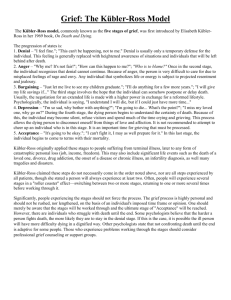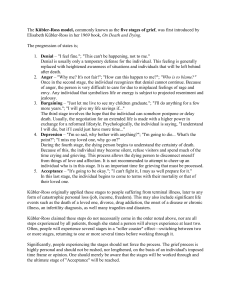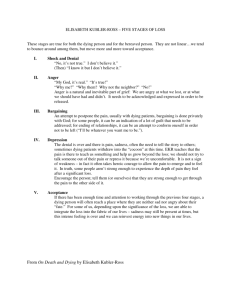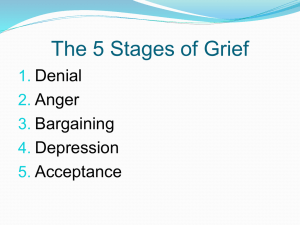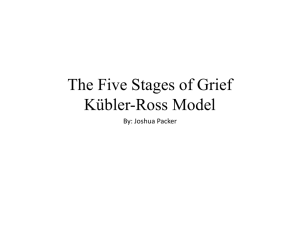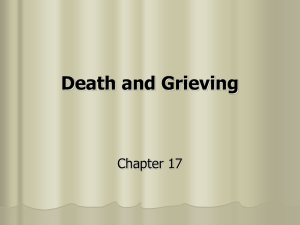Week29-30 - Death Part1 and 2
advertisement
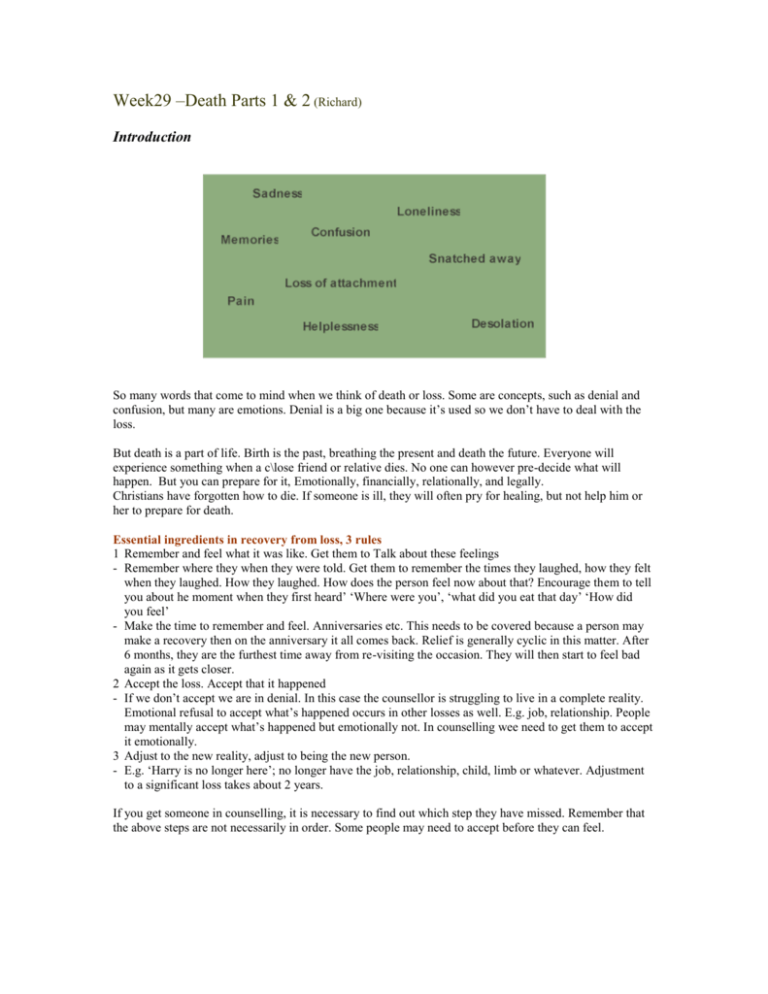
Week29 –Death Parts 1 & 2 (Richard) Introduction So many words that come to mind when we think of death or loss. Some are concepts, such as denial and confusion, but many are emotions. Denial is a big one because it’s used so we don’t have to deal with the loss. But death is a part of life. Birth is the past, breathing the present and death the future. Everyone will experience something when a c\lose friend or relative dies. No one can however pre-decide what will happen. But you can prepare for it, Emotionally, financially, relationally, and legally. Christians have forgotten how to die. If someone is ill, they will often pry for healing, but not help him or her to prepare for death. Essential ingredients in recovery from loss, 3 rules 1 Remember and feel what it was like. Get them to Talk about these feelings - Remember where they when they were told. Get them to remember the times they laughed, how they felt when they laughed. How they laughed. How does the person feel now about that? Encourage them to tell you about he moment when they first heard’ ‘Where were you’, ‘what did you eat that day’ ‘How did you feel’ - Make the time to remember and feel. Anniversaries etc. This needs to be covered because a person may make a recovery then on the anniversary it all comes back. Relief is generally cyclic in this matter. After 6 months, they are the furthest time away from re-visiting the occasion. They will then start to feel bad again as it gets closer. 2 Accept the loss. Accept that it happened - If we don’t accept we are in denial. In this case the counsellor is struggling to live in a complete reality. Emotional refusal to accept what’s happened occurs in other losses as well. E.g. job, relationship. People may mentally accept what’s happened but emotionally not. In counselling wee need to get them to accept it emotionally. 3 Adjust to the new reality, adjust to being the new person. - E.g. ‘Harry is no longer here’; no longer have the job, relationship, child, limb or whatever. Adjustment to a significant loss takes about 2 years. If you get someone in counselling, it is necessary to find out which step they have missed. Remember that the above steps are not necessarily in order. Some people may need to accept before they can feel. Progression of feelings in transitions Em otions 7 Coping 1 2 6 3 W orse 5 4 Tim e 1) Immobilization/shock Immobilization is a sudden numbing; the body preparing for shock. Things are too much. For some it may be very quick, even a split second, for others this may last months. 2) Denial - They don’t believe in this. It can’t be real; they’ll wake up from this nightmare. It’s an emotional refusal to accept reality. - Denial is not a totally bad thing however. It’s the force that allows time to prepare for reality. Classic denial is addiction. - They will slowly come out, and then express their feelings later. One reason for funerals is that it gets us out of denial. This also means that where there is no body, there can be a confusion of denial. Confusion also occurs when there is a lack of understanding for the reasons e.g. I suicide or homicide. 3) Despair/ powerlessness - Head down, sadness, depression, anger, blame. The person begins to feel guilt. Back from the funeral, all the relatives have left after a few weeks, and they are suddenly alone. The empty bed, the empty place at the table. Begins to really hurt. 4) Rock bottom/I can survive/Letting go - For persons at this point they are not going to see the rest of the graph. Show them to see that there is another side. They ay feel in despair or suicidal. Find another smaller loss in their life, money, relationships, even car keys. Show them that the graph is the same, that slowly they adjust, that there is life after a loss. - Small losses are important practice for us. 5) Testing (frustration/failure/anger) - We keep waking up on a daily basis, still here and forgetting about the pain. This is the beginning of letting go. There are sharp jolts of pain but they are not permanent. There is a realization that life goes on. Lots of feelings associated with this area. Anger guilt, failure, and frustration. It feels hard when you laugh for the first time. There is one foot in each world, one on moving on and one foot in the past. A learning they can live without. An adjustment to a new reality. A photo may cause a step back, then causing frustration for the person because they realise this 6) New meaning/how things are different - Life is different. They see things different now bit this is ok. They can enjoy and celebrate the difference. This step will lead to…. 7) Integration/reconciliation - Integrate and accept the changes and become reconciled to the loss. Note that 7 is higher than 1. Notes - Because of what has been learned from the loss, the person comes out stronger. - Helping people on the journey. Steps ½ coping. People are just coping with life and they want to get better. Need to get them to understand that it’s going to get worse - In counselling we are going to talk about things that they don’t want to talk about. - Whatever happens don’t let them go at steps 3 and 4 - For someone coming from loss, beware of new relationships. What is the motivation for the relationship, is it to get out of the pain? Homework - My Thoughts about Death Death must be an awfully big adventure- Peter Pan The following are some questions regarding your own personal experience of death and dying. You may find some the questions difficult to answer, but we are looking for your immediate response rather than detailed thoughts about the issues we raise. Please try to answer every question or indicate perhaps why you feel unable to answer. 1. What was the youngest age you remember someone close to you dying? What did you feel at the time? Complete the following sentences: 2. If I learned I was dying I would feel: 3. If I learned I was dying I would: 4. If this were the last year of my life, my biggest regret would be: 5. If this were the last year of my life, my biggest sense of accomplishment would be: 6. If this were the last year of my life I would be most thankful -for: 7. The first person I remember dying was: 8. I lost my first parent when I was 9.The most recent death for me was: 10. The time I felt closest to death was: 11. Would you want to know you were dying? Yes No 12. If yes, how would you wish to find out you were dying? 13. Where would you like to be when you die? 14. What way would you definitely not wish to die? 15. What would be the most acceptable way for you to die? Counseling Techniques 1 When counselling someone, use careful questions at the end of a session. How can this be good for you? how might it be helpful?, what have you gained? How have you moved on? - What have you learned from this (Focusing on something meaningful, strengthening, positive)? - This is especially helpful in section 6 of the diagram above 2 Its Ok for them to cry because that’s what they need and they cant necessarily do it at home. Puts things back into pace so they are not in bits for the rest of the week. Make them aware it’s not only ok to cry, its normal to cry. 3 ‘you’re in a deep place, and got to a painful pace this week’. I’d like you to think how this might have been good for you. 4 post suicide grief. If they Cant express anger etc. try getting them to write a letter. 5 What has the person lost? Get tem to see their loss, Attachment, intimacy, role (child or father), no one to share with, loss of dreams, loss of history, loss of future, loss of access to others, 6 What does this person need? (Understanding). Do not become a substitute. This is transference. We are a place to connect them to new needs. 7 if they have no dreams etc, how do you give them hope? Ask when you are ready what would you like to do. What haven’t you done you’d like to. Show them new opportunities. 8 Compound grief (accumulative) Here the grieving appears out of proportion to the event. E.g. a client, who has lost a relationship after 18 months, even thought there were so many problems in the relationship when it was going. E.g. only lost job, yet devastated. Explore other loss experiences. Question, with this grief, who/what is it for. Also who is it for if there are multiple deaths?
